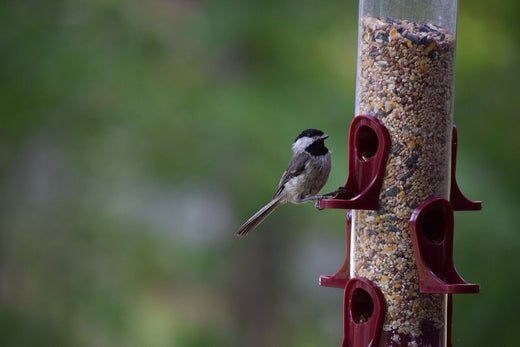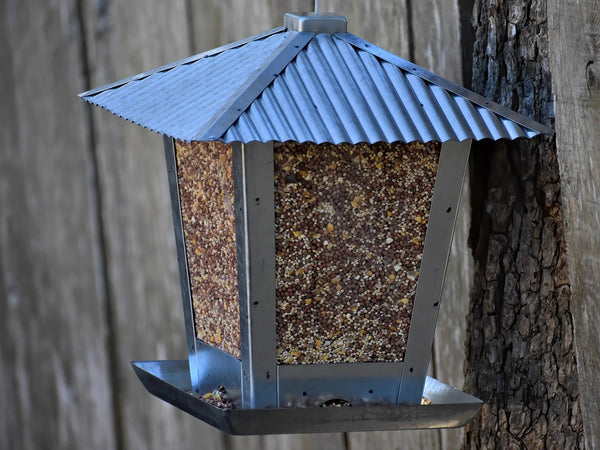
Why Cleaning Bird Feeders is Non-Negotiable
Share
Bird feeders bring joy to our gardens and vital support to our feathered friends, but they can also become hotspots for disease if not maintained properly. Cleaning bird feeders isn’t just good practice—it’s essential for protecting bird health and ensuring their long-term survival. This blog explores why cleaning feeders is critical, the risks of neglecting hygiene, and practical steps for maintaining a safe feeding environment.
The Risks of Dirty Feeders
Bird feeders that are not cleaned regularly can harbour bacteria, fungi, and parasites, posing significant risks to birds. Common issues include:
- Disease Transmission: Pathogens like salmonella, trichomonosis, and avian pox thrive in dirty feeding stations, spreading easily among congregating birds.
- Mould Growth: Damp or spoiled food promotes mould, which can produce mycotoxins harmful to birds’ respiratory and digestive systems.
- Pests and Contamination: Dirty feeders attract pests, which can introduce additional health hazards.
- Waste Build-Up: Accumulated debris and droppings can create an unhealthy environment and deter birds from visiting.

Why Regular Cleaning is Essential
Maintaining clean feeders helps:
- Prevent disease outbreaks.
- Protect birds from ingesting harmful organisms, mould or toxins.
- Ensure food remains fresh and nutritious.
- Encourage birds to return, knowing the environment is safe.
How Often Should You Clean Feeders?
Cleaning frequency depends on usage and weather conditions, but as a general rule:
- Weekly: Clean feeders thoroughly to prevent build-up of waste and bacteria.
- More Frequently: During wet or warm weather, clean every 2–3 days to avoid mould growth.
Step-by-Step Guide to Cleaning Feeders
- Empty Feeders: Remove all food, including crumbs and debris. Dispose of any spoiled or damp food.
- Disassemble Feeders: If possible, take feeders apart to access all surfaces and corners.
- Scrub with Soapy Water: Use warm, soapy water and a brush to clean thoroughly. Focus on feeding ports and crevices where dirt accumulates.
- Disinfect: Apply a wildlife-safe disinfectant, such as Safe4 Disinfectant, to kill bacteria and viruses. Follow the product instructions for dilution and application.
- Rinse Well: Ensure all soap and disinfectant residue is removed by rinsing thoroughly with clean water.
- Dry Completely: Allow feeders to air dry completely before refilling with fresh food. Wet feeders can encourage mould growth.

Best Practices for Safe Feeding
- Rotate Feeding Spots: Move feeders periodically to avoid waste accumulation and reduce the risk of contamination.
- Use High-Quality Food: Provide clean, nutritious food, such as Haith’s SuperClean™ diets, to minimise waste and contamination risks.
- Inspect Feeders Regularly: Check for signs of wear, sharp edges, or cracks that could trap bacteria or harm birds.
- Monitor Bird Health: Watch for possible illness among visiting birds and take action if clinical signs appear.
The Role of Clean Feeders in Bird Welfare
By cleaning feeders regularly, you’re creating a safer environment that supports bird health and encourages natural behaviours. Healthy birds are more likely to thrive, reproduce, and contribute to local biodiversity.

A Shared Responsibility
Feeding birds is a partnership with nature, and maintaining clean feeders is a vital part of that responsibility. When you prioritise hygiene, you’re not just protecting individual birds—you’re helping to sustain entire populations.
At Haith’s, we’re committed to promoting safe feeding practices and providing the highest quality bird food and hygiene products. Explore our range of SUPERCLEAN™ diets, cleaning tools, and wildlife-safe disinfectants at Haith’s to make your garden a haven for birds.
Written by Haith's
